Organisational Behaviour Report: Ryanair, Power, Culture, Politics
VerifiedAdded on 2023/01/19
|17
|5721
|54
Report
AI Summary
This report provides a detailed analysis of organisational behaviour within Ryanair, examining the influence of culture, power dynamics, and political factors on individual and team performance. It explores Handy's culture typology and French and Raven's power types, offering insights into how these elements shape employee behavior and productivity. The report further delves into motivational theories, including Vroom's expectancy theory and Adam's equity theory, to understand how Ryanair can effectively motivate its employees. Additionally, it discusses effective and ineffective team dynamics and applies organisational behaviour concepts to real-world business situations. The report concludes with recommendations for improving organisational practices and fostering a positive work environment within Ryanair.
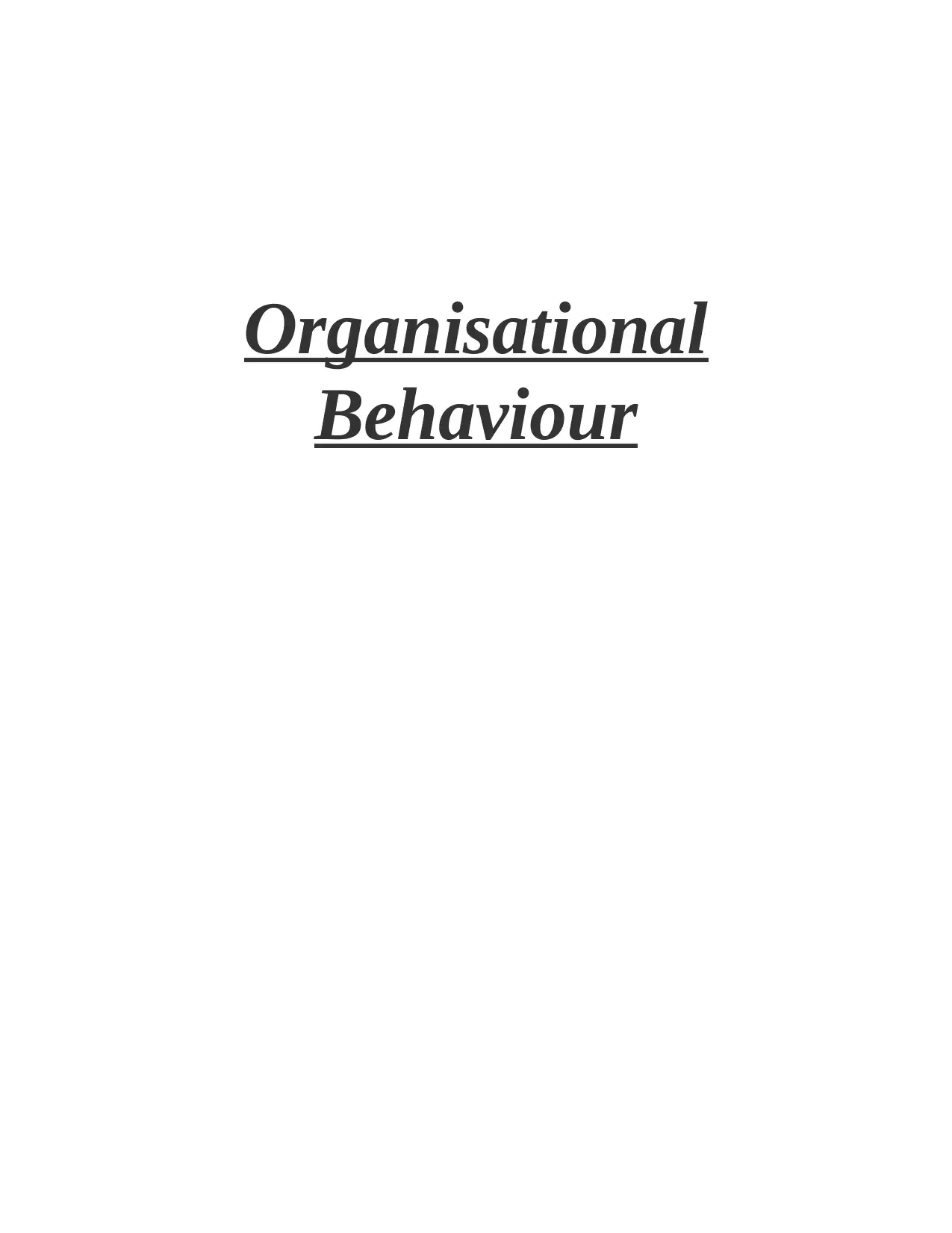
Organisational
Behaviour
Behaviour
Paraphrase This Document
Need a fresh take? Get an instant paraphrase of this document with our AI Paraphraser
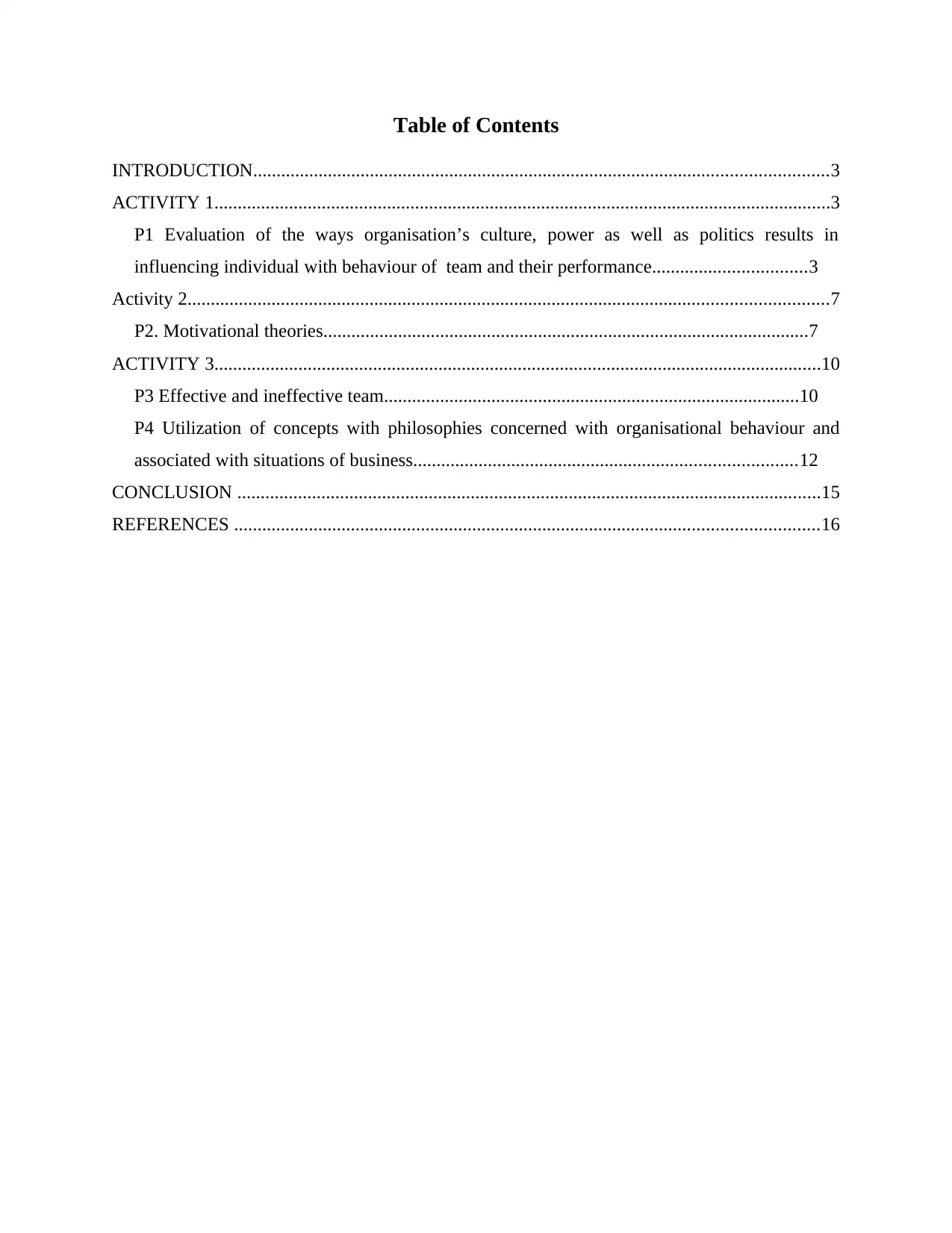
Table of Contents
INTRODUCTION...........................................................................................................................3
ACTIVITY 1....................................................................................................................................3
P1 Evaluation of the ways organisation’s culture, power as well as politics results in
influencing individual with behaviour of team and their performance.................................3
Activity 2.........................................................................................................................................7
P2. Motivational theories........................................................................................................7
ACTIVITY 3..................................................................................................................................10
P3 Effective and ineffective team.........................................................................................10
P4 Utilization of concepts with philosophies concerned with organisational behaviour and
associated with situations of business..................................................................................12
CONCLUSION .............................................................................................................................15
REFERENCES .............................................................................................................................16
INTRODUCTION...........................................................................................................................3
ACTIVITY 1....................................................................................................................................3
P1 Evaluation of the ways organisation’s culture, power as well as politics results in
influencing individual with behaviour of team and their performance.................................3
Activity 2.........................................................................................................................................7
P2. Motivational theories........................................................................................................7
ACTIVITY 3..................................................................................................................................10
P3 Effective and ineffective team.........................................................................................10
P4 Utilization of concepts with philosophies concerned with organisational behaviour and
associated with situations of business..................................................................................12
CONCLUSION .............................................................................................................................15
REFERENCES .............................................................................................................................16
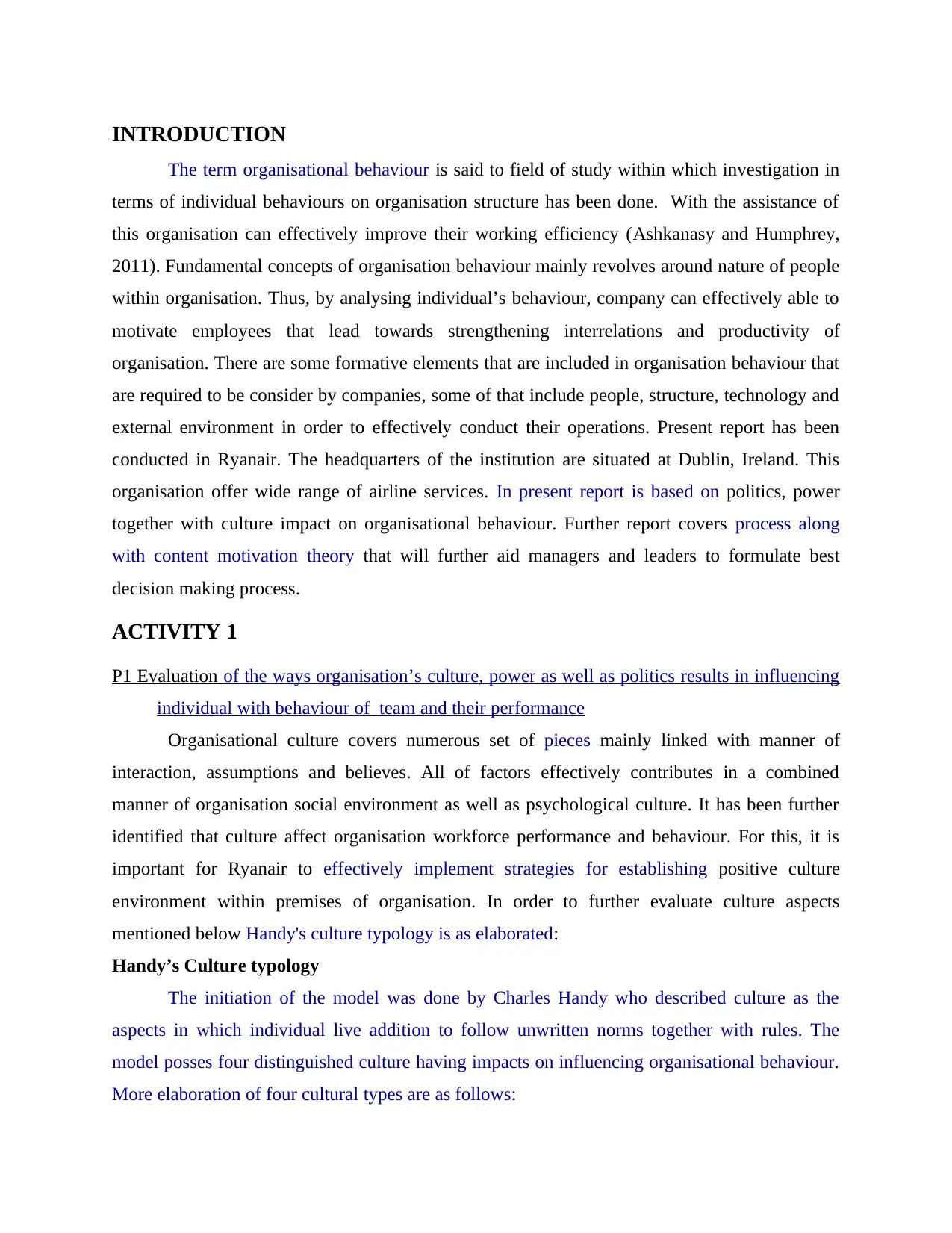
INTRODUCTION
The term organisational behaviour is said to field of study within which investigation in
terms of individual behaviours on organisation structure has been done. With the assistance of
this organisation can effectively improve their working efficiency (Ashkanasy and Humphrey,
2011). Fundamental concepts of organisation behaviour mainly revolves around nature of people
within organisation. Thus, by analysing individual’s behaviour, company can effectively able to
motivate employees that lead towards strengthening interrelations and productivity of
organisation. There are some formative elements that are included in organisation behaviour that
are required to be consider by companies, some of that include people, structure, technology and
external environment in order to effectively conduct their operations. Present report has been
conducted in Ryanair. The headquarters of the institution are situated at Dublin, Ireland. This
organisation offer wide range of airline services. In present report is based on politics, power
together with culture impact on organisational behaviour. Further report covers process along
with content motivation theory that will further aid managers and leaders to formulate best
decision making process.
ACTIVITY 1
P1 Evaluation of the ways organisation’s culture, power as well as politics results in influencing
individual with behaviour of team and their performance
Organisational culture covers numerous set of pieces mainly linked with manner of
interaction, assumptions and believes. All of factors effectively contributes in a combined
manner of organisation social environment as well as psychological culture. It has been further
identified that culture affect organisation workforce performance and behaviour. For this, it is
important for Ryanair to effectively implement strategies for establishing positive culture
environment within premises of organisation. In order to further evaluate culture aspects
mentioned below Handy's culture typology is as elaborated:
Handy’s Culture typology
The initiation of the model was done by Charles Handy who described culture as the
aspects in which individual live addition to follow unwritten norms together with rules. The
model posses four distinguished culture having impacts on influencing organisational behaviour.
More elaboration of four cultural types are as follows:
The term organisational behaviour is said to field of study within which investigation in
terms of individual behaviours on organisation structure has been done. With the assistance of
this organisation can effectively improve their working efficiency (Ashkanasy and Humphrey,
2011). Fundamental concepts of organisation behaviour mainly revolves around nature of people
within organisation. Thus, by analysing individual’s behaviour, company can effectively able to
motivate employees that lead towards strengthening interrelations and productivity of
organisation. There are some formative elements that are included in organisation behaviour that
are required to be consider by companies, some of that include people, structure, technology and
external environment in order to effectively conduct their operations. Present report has been
conducted in Ryanair. The headquarters of the institution are situated at Dublin, Ireland. This
organisation offer wide range of airline services. In present report is based on politics, power
together with culture impact on organisational behaviour. Further report covers process along
with content motivation theory that will further aid managers and leaders to formulate best
decision making process.
ACTIVITY 1
P1 Evaluation of the ways organisation’s culture, power as well as politics results in influencing
individual with behaviour of team and their performance
Organisational culture covers numerous set of pieces mainly linked with manner of
interaction, assumptions and believes. All of factors effectively contributes in a combined
manner of organisation social environment as well as psychological culture. It has been further
identified that culture affect organisation workforce performance and behaviour. For this, it is
important for Ryanair to effectively implement strategies for establishing positive culture
environment within premises of organisation. In order to further evaluate culture aspects
mentioned below Handy's culture typology is as elaborated:
Handy’s Culture typology
The initiation of the model was done by Charles Handy who described culture as the
aspects in which individual live addition to follow unwritten norms together with rules. The
model posses four distinguished culture having impacts on influencing organisational behaviour.
More elaboration of four cultural types are as follows:
⊘ This is a preview!⊘
Do you want full access?
Subscribe today to unlock all pages.

Trusted by 1+ million students worldwide
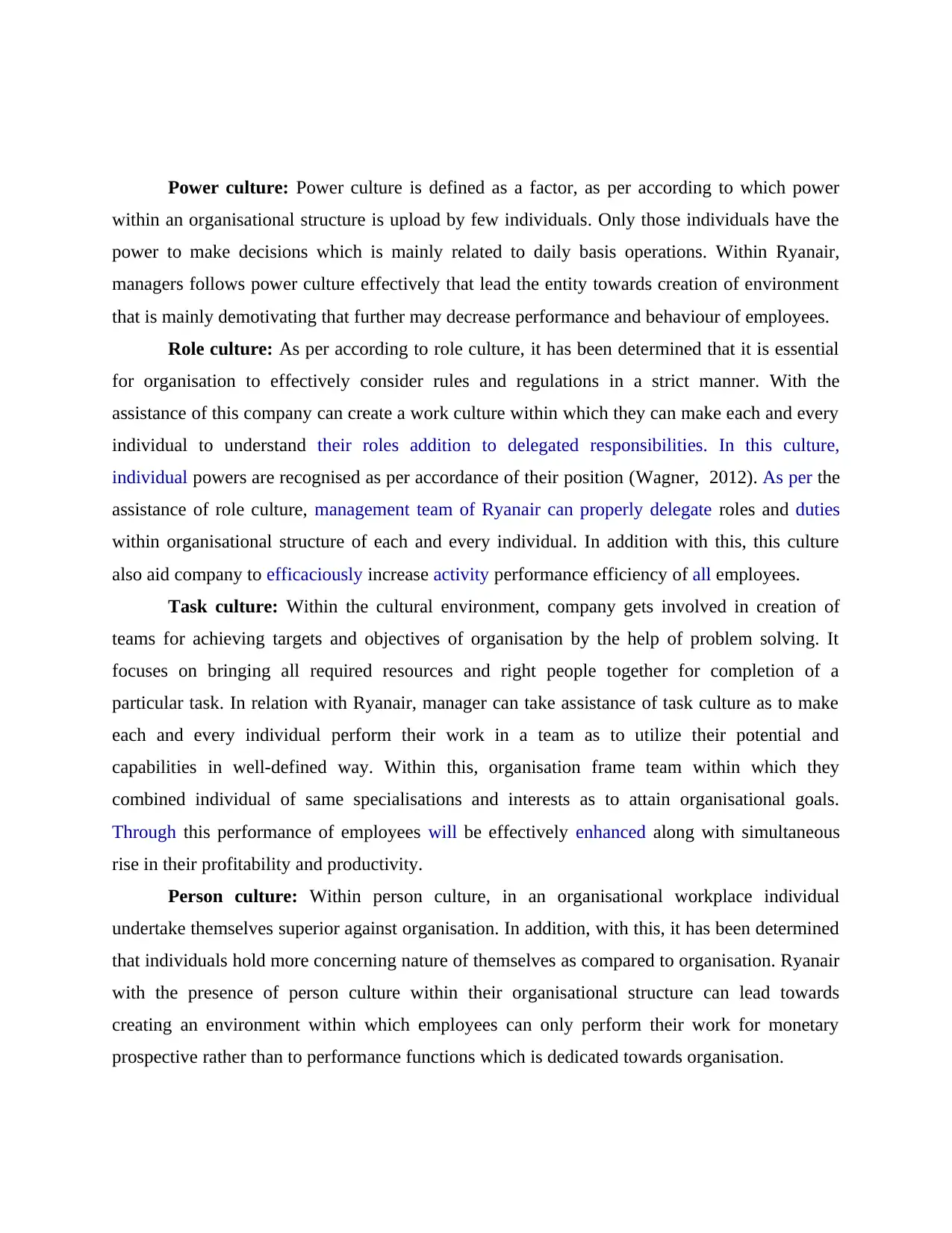
Power culture: Power culture is defined as a factor, as per according to which power
within an organisational structure is upload by few individuals. Only those individuals have the
power to make decisions which is mainly related to daily basis operations. Within Ryanair,
managers follows power culture effectively that lead the entity towards creation of environment
that is mainly demotivating that further may decrease performance and behaviour of employees.
Role culture: As per according to role culture, it has been determined that it is essential
for organisation to effectively consider rules and regulations in a strict manner. With the
assistance of this company can create a work culture within which they can make each and every
individual to understand their roles addition to delegated responsibilities. In this culture,
individual powers are recognised as per accordance of their position (Wagner, 2012). As per the
assistance of role culture, management team of Ryanair can properly delegate roles and duties
within organisational structure of each and every individual. In addition with this, this culture
also aid company to efficaciously increase activity performance efficiency of all employees.
Task culture: Within the cultural environment, company gets involved in creation of
teams for achieving targets and objectives of organisation by the help of problem solving. It
focuses on bringing all required resources and right people together for completion of a
particular task. In relation with Ryanair, manager can take assistance of task culture as to make
each and every individual perform their work in a team as to utilize their potential and
capabilities in well-defined way. Within this, organisation frame team within which they
combined individual of same specialisations and interests as to attain organisational goals.
Through this performance of employees will be effectively enhanced along with simultaneous
rise in their profitability and productivity.
Person culture: Within person culture, in an organisational workplace individual
undertake themselves superior against organisation. In addition, with this, it has been determined
that individuals hold more concerning nature of themselves as compared to organisation. Ryanair
with the presence of person culture within their organisational structure can lead towards
creating an environment within which employees can only perform their work for monetary
prospective rather than to performance functions which is dedicated towards organisation.
within an organisational structure is upload by few individuals. Only those individuals have the
power to make decisions which is mainly related to daily basis operations. Within Ryanair,
managers follows power culture effectively that lead the entity towards creation of environment
that is mainly demotivating that further may decrease performance and behaviour of employees.
Role culture: As per according to role culture, it has been determined that it is essential
for organisation to effectively consider rules and regulations in a strict manner. With the
assistance of this company can create a work culture within which they can make each and every
individual to understand their roles addition to delegated responsibilities. In this culture,
individual powers are recognised as per accordance of their position (Wagner, 2012). As per the
assistance of role culture, management team of Ryanair can properly delegate roles and duties
within organisational structure of each and every individual. In addition with this, this culture
also aid company to efficaciously increase activity performance efficiency of all employees.
Task culture: Within the cultural environment, company gets involved in creation of
teams for achieving targets and objectives of organisation by the help of problem solving. It
focuses on bringing all required resources and right people together for completion of a
particular task. In relation with Ryanair, manager can take assistance of task culture as to make
each and every individual perform their work in a team as to utilize their potential and
capabilities in well-defined way. Within this, organisation frame team within which they
combined individual of same specialisations and interests as to attain organisational goals.
Through this performance of employees will be effectively enhanced along with simultaneous
rise in their profitability and productivity.
Person culture: Within person culture, in an organisational workplace individual
undertake themselves superior against organisation. In addition, with this, it has been determined
that individuals hold more concerning nature of themselves as compared to organisation. Ryanair
with the presence of person culture within their organisational structure can lead towards
creating an environment within which employees can only perform their work for monetary
prospective rather than to performance functions which is dedicated towards organisation.
Paraphrase This Document
Need a fresh take? Get an instant paraphrase of this document with our AI Paraphraser
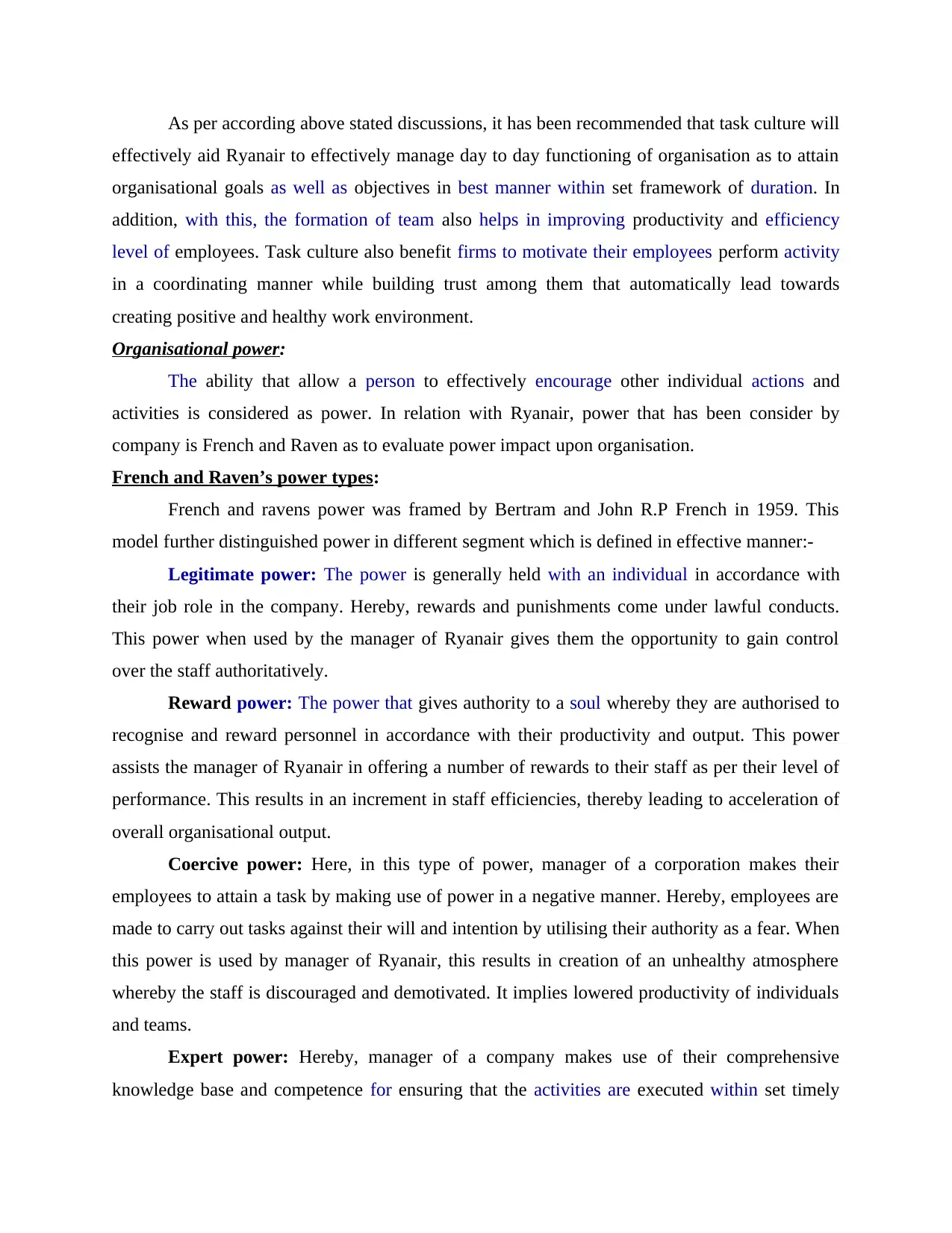
As per according above stated discussions, it has been recommended that task culture will
effectively aid Ryanair to effectively manage day to day functioning of organisation as to attain
organisational goals as well as objectives in best manner within set framework of duration. In
addition, with this, the formation of team also helps in improving productivity and efficiency
level of employees. Task culture also benefit firms to motivate their employees perform activity
in a coordinating manner while building trust among them that automatically lead towards
creating positive and healthy work environment.
Organisational power:
The ability that allow a person to effectively encourage other individual actions and
activities is considered as power. In relation with Ryanair, power that has been consider by
company is French and Raven as to evaluate power impact upon organisation.
French and Raven’s power types:
French and ravens power was framed by Bertram and John R.P French in 1959. This
model further distinguished power in different segment which is defined in effective manner:-
Legitimate power: The power is generally held with an individual in accordance with
their job role in the company. Hereby, rewards and punishments come under lawful conducts.
This power when used by the manager of Ryanair gives them the opportunity to gain control
over the staff authoritatively.
Reward power: The power that gives authority to a soul whereby they are authorised to
recognise and reward personnel in accordance with their productivity and output. This power
assists the manager of Ryanair in offering a number of rewards to their staff as per their level of
performance. This results in an increment in staff efficiencies, thereby leading to acceleration of
overall organisational output.
Coercive power: Here, in this type of power, manager of a corporation makes their
employees to attain a task by making use of power in a negative manner. Hereby, employees are
made to carry out tasks against their will and intention by utilising their authority as a fear. When
this power is used by manager of Ryanair, this results in creation of an unhealthy atmosphere
whereby the staff is discouraged and demotivated. It implies lowered productivity of individuals
and teams.
Expert power: Hereby, manager of a company makes use of their comprehensive
knowledge base and competence for ensuring that the activities are executed within set timely
effectively aid Ryanair to effectively manage day to day functioning of organisation as to attain
organisational goals as well as objectives in best manner within set framework of duration. In
addition, with this, the formation of team also helps in improving productivity and efficiency
level of employees. Task culture also benefit firms to motivate their employees perform activity
in a coordinating manner while building trust among them that automatically lead towards
creating positive and healthy work environment.
Organisational power:
The ability that allow a person to effectively encourage other individual actions and
activities is considered as power. In relation with Ryanair, power that has been consider by
company is French and Raven as to evaluate power impact upon organisation.
French and Raven’s power types:
French and ravens power was framed by Bertram and John R.P French in 1959. This
model further distinguished power in different segment which is defined in effective manner:-
Legitimate power: The power is generally held with an individual in accordance with
their job role in the company. Hereby, rewards and punishments come under lawful conducts.
This power when used by the manager of Ryanair gives them the opportunity to gain control
over the staff authoritatively.
Reward power: The power that gives authority to a soul whereby they are authorised to
recognise and reward personnel in accordance with their productivity and output. This power
assists the manager of Ryanair in offering a number of rewards to their staff as per their level of
performance. This results in an increment in staff efficiencies, thereby leading to acceleration of
overall organisational output.
Coercive power: Here, in this type of power, manager of a corporation makes their
employees to attain a task by making use of power in a negative manner. Hereby, employees are
made to carry out tasks against their will and intention by utilising their authority as a fear. When
this power is used by manager of Ryanair, this results in creation of an unhealthy atmosphere
whereby the staff is discouraged and demotivated. It implies lowered productivity of individuals
and teams.
Expert power: Hereby, manager of a company makes use of their comprehensive
knowledge base and competence for ensuring that the activities are executed within set timely
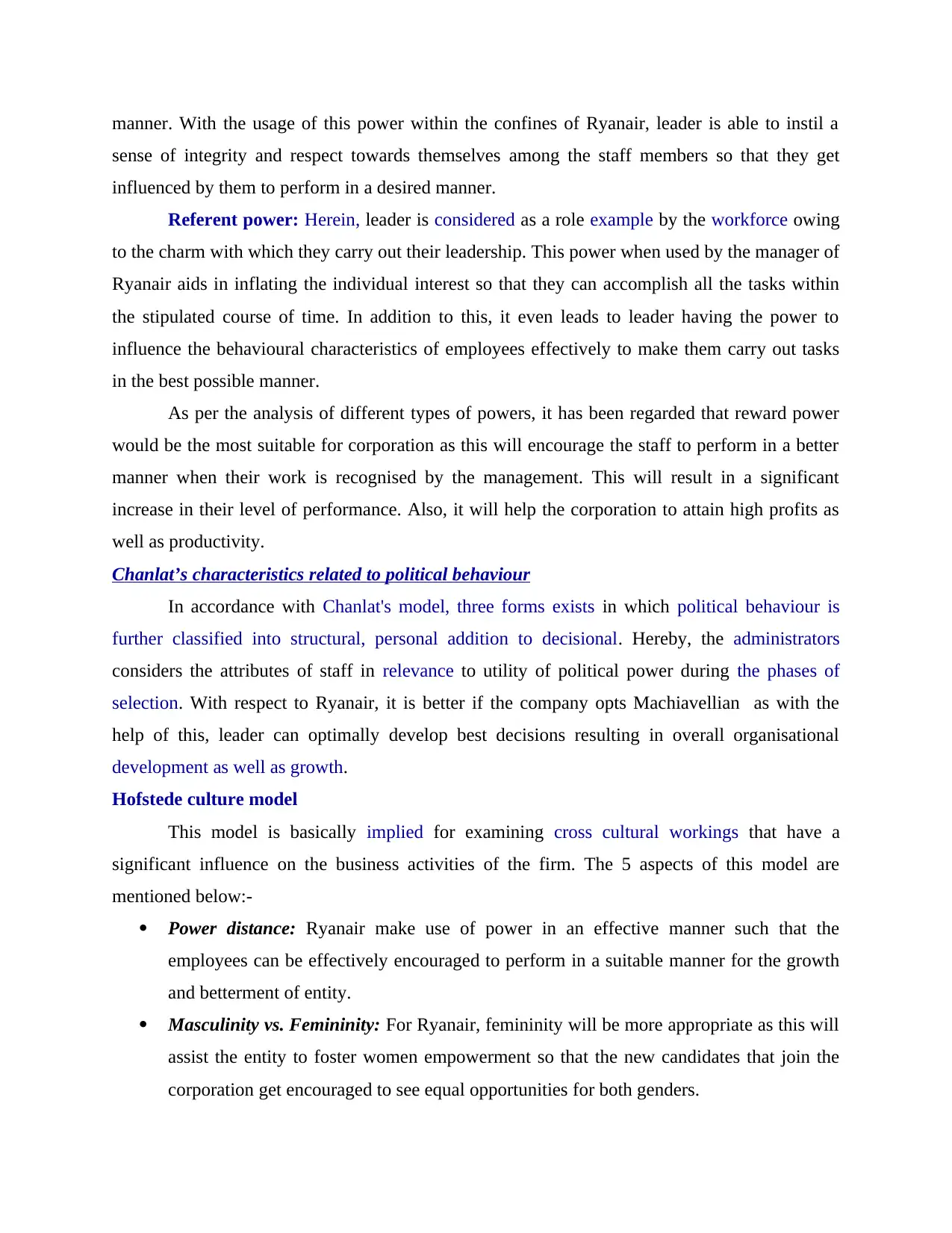
manner. With the usage of this power within the confines of Ryanair, leader is able to instil a
sense of integrity and respect towards themselves among the staff members so that they get
influenced by them to perform in a desired manner.
Referent power: Herein, leader is considered as a role example by the workforce owing
to the charm with which they carry out their leadership. This power when used by the manager of
Ryanair aids in inflating the individual interest so that they can accomplish all the tasks within
the stipulated course of time. In addition to this, it even leads to leader having the power to
influence the behavioural characteristics of employees effectively to make them carry out tasks
in the best possible manner.
As per the analysis of different types of powers, it has been regarded that reward power
would be the most suitable for corporation as this will encourage the staff to perform in a better
manner when their work is recognised by the management. This will result in a significant
increase in their level of performance. Also, it will help the corporation to attain high profits as
well as productivity.
Chanlat’s characteristics related to political behaviour
In accordance with Chanlat's model, three forms exists in which political behaviour is
further classified into structural, personal addition to decisional. Hereby, the administrators
considers the attributes of staff in relevance to utility of political power during the phases of
selection. With respect to Ryanair, it is better if the company opts Machiavellian as with the
help of this, leader can optimally develop best decisions resulting in overall organisational
development as well as growth.
Hofstede culture model
This model is basically implied for examining cross cultural workings that have a
significant influence on the business activities of the firm. The 5 aspects of this model are
mentioned below:-
Power distance: Ryanair make use of power in an effective manner such that the
employees can be effectively encouraged to perform in a suitable manner for the growth
and betterment of entity.
Masculinity vs. Femininity: For Ryanair, femininity will be more appropriate as this will
assist the entity to foster women empowerment so that the new candidates that join the
corporation get encouraged to see equal opportunities for both genders.
sense of integrity and respect towards themselves among the staff members so that they get
influenced by them to perform in a desired manner.
Referent power: Herein, leader is considered as a role example by the workforce owing
to the charm with which they carry out their leadership. This power when used by the manager of
Ryanair aids in inflating the individual interest so that they can accomplish all the tasks within
the stipulated course of time. In addition to this, it even leads to leader having the power to
influence the behavioural characteristics of employees effectively to make them carry out tasks
in the best possible manner.
As per the analysis of different types of powers, it has been regarded that reward power
would be the most suitable for corporation as this will encourage the staff to perform in a better
manner when their work is recognised by the management. This will result in a significant
increase in their level of performance. Also, it will help the corporation to attain high profits as
well as productivity.
Chanlat’s characteristics related to political behaviour
In accordance with Chanlat's model, three forms exists in which political behaviour is
further classified into structural, personal addition to decisional. Hereby, the administrators
considers the attributes of staff in relevance to utility of political power during the phases of
selection. With respect to Ryanair, it is better if the company opts Machiavellian as with the
help of this, leader can optimally develop best decisions resulting in overall organisational
development as well as growth.
Hofstede culture model
This model is basically implied for examining cross cultural workings that have a
significant influence on the business activities of the firm. The 5 aspects of this model are
mentioned below:-
Power distance: Ryanair make use of power in an effective manner such that the
employees can be effectively encouraged to perform in a suitable manner for the growth
and betterment of entity.
Masculinity vs. Femininity: For Ryanair, femininity will be more appropriate as this will
assist the entity to foster women empowerment so that the new candidates that join the
corporation get encouraged to see equal opportunities for both genders.
⊘ This is a preview!⊘
Do you want full access?
Subscribe today to unlock all pages.

Trusted by 1+ million students worldwide
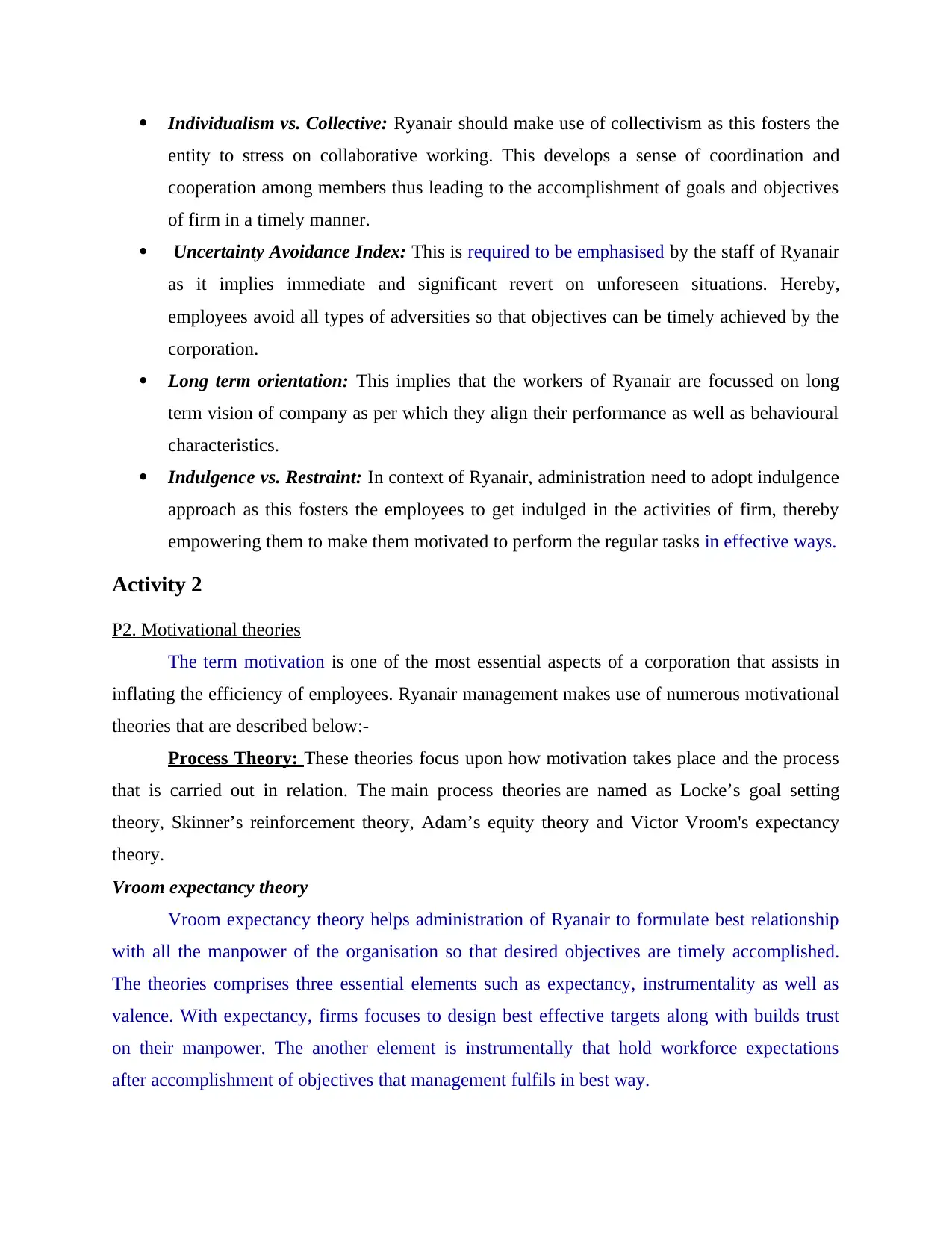
Individualism vs. Collective: Ryanair should make use of collectivism as this fosters the
entity to stress on collaborative working. This develops a sense of coordination and
cooperation among members thus leading to the accomplishment of goals and objectives
of firm in a timely manner.
Uncertainty Avoidance Index: This is required to be emphasised by the staff of Ryanair
as it implies immediate and significant revert on unforeseen situations. Hereby,
employees avoid all types of adversities so that objectives can be timely achieved by the
corporation.
Long term orientation: This implies that the workers of Ryanair are focussed on long
term vision of company as per which they align their performance as well as behavioural
characteristics.
Indulgence vs. Restraint: In context of Ryanair, administration need to adopt indulgence
approach as this fosters the employees to get indulged in the activities of firm, thereby
empowering them to make them motivated to perform the regular tasks in effective ways.
Activity 2
P2. Motivational theories
The term motivation is one of the most essential aspects of a corporation that assists in
inflating the efficiency of employees. Ryanair management makes use of numerous motivational
theories that are described below:-
Process Theory: These theories focus upon how motivation takes place and the process
that is carried out in relation. The main process theories are named as Locke’s goal setting
theory, Skinner’s reinforcement theory, Adam’s equity theory and Victor Vroom's expectancy
theory.
Vroom expectancy theory
Vroom expectancy theory helps administration of Ryanair to formulate best relationship
with all the manpower of the organisation so that desired objectives are timely accomplished.
The theories comprises three essential elements such as expectancy, instrumentality as well as
valence. With expectancy, firms focuses to design best effective targets along with builds trust
on their manpower. The another element is instrumentally that hold workforce expectations
after accomplishment of objectives that management fulfils in best way.
entity to stress on collaborative working. This develops a sense of coordination and
cooperation among members thus leading to the accomplishment of goals and objectives
of firm in a timely manner.
Uncertainty Avoidance Index: This is required to be emphasised by the staff of Ryanair
as it implies immediate and significant revert on unforeseen situations. Hereby,
employees avoid all types of adversities so that objectives can be timely achieved by the
corporation.
Long term orientation: This implies that the workers of Ryanair are focussed on long
term vision of company as per which they align their performance as well as behavioural
characteristics.
Indulgence vs. Restraint: In context of Ryanair, administration need to adopt indulgence
approach as this fosters the employees to get indulged in the activities of firm, thereby
empowering them to make them motivated to perform the regular tasks in effective ways.
Activity 2
P2. Motivational theories
The term motivation is one of the most essential aspects of a corporation that assists in
inflating the efficiency of employees. Ryanair management makes use of numerous motivational
theories that are described below:-
Process Theory: These theories focus upon how motivation takes place and the process
that is carried out in relation. The main process theories are named as Locke’s goal setting
theory, Skinner’s reinforcement theory, Adam’s equity theory and Victor Vroom's expectancy
theory.
Vroom expectancy theory
Vroom expectancy theory helps administration of Ryanair to formulate best relationship
with all the manpower of the organisation so that desired objectives are timely accomplished.
The theories comprises three essential elements such as expectancy, instrumentality as well as
valence. With expectancy, firms focuses to design best effective targets along with builds trust
on their manpower. The another element is instrumentally that hold workforce expectations
after accomplishment of objectives that management fulfils in best way.
Paraphrase This Document
Need a fresh take? Get an instant paraphrase of this document with our AI Paraphraser
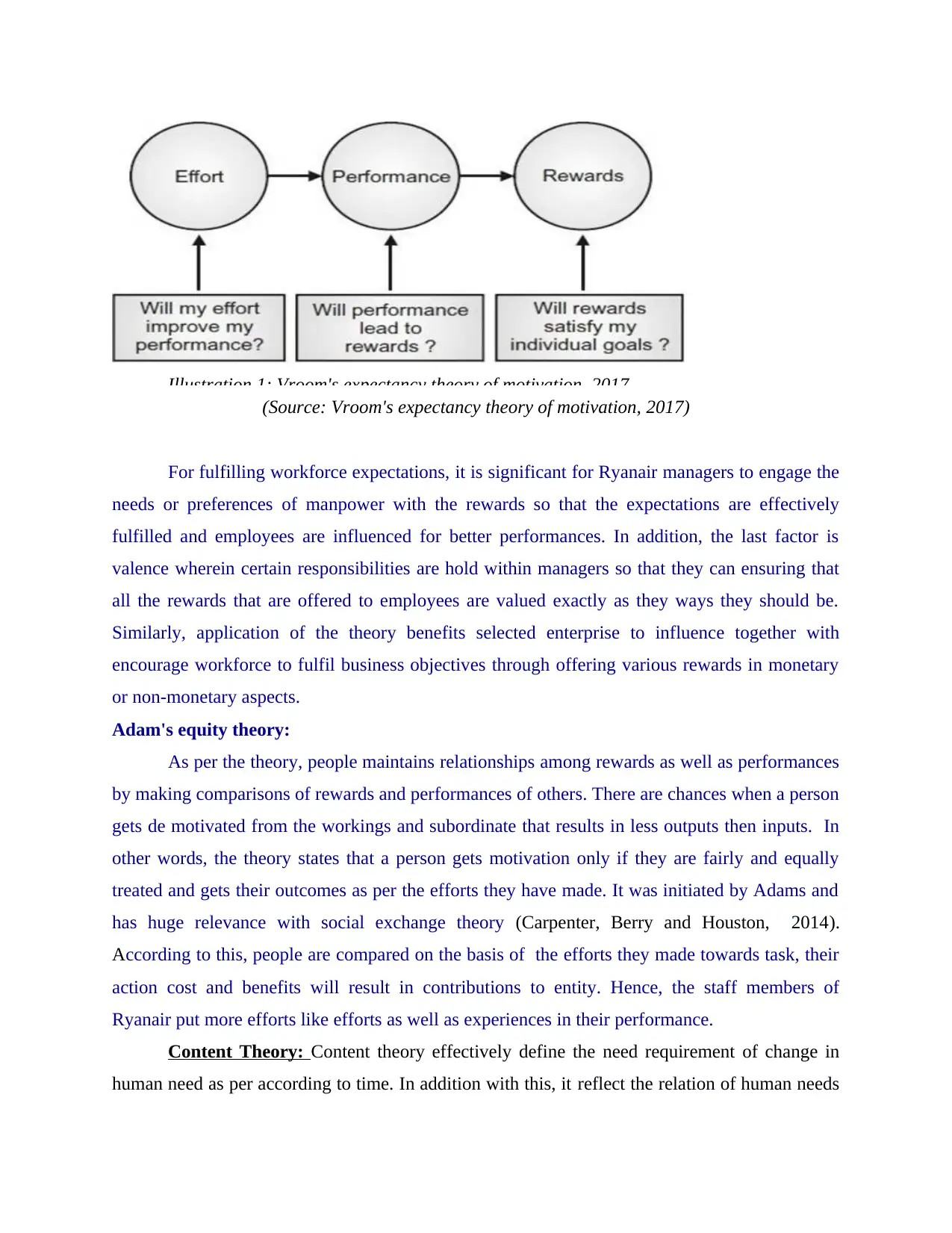
Illustration 1: Vroom's expectancy theory of motivation. 2017
(Source: Vroom's expectancy theory of motivation, 2017)
For fulfilling workforce expectations, it is significant for Ryanair managers to engage the
needs or preferences of manpower with the rewards so that the expectations are effectively
fulfilled and employees are influenced for better performances. In addition, the last factor is
valence wherein certain responsibilities are hold within managers so that they can ensuring that
all the rewards that are offered to employees are valued exactly as they ways they should be.
Similarly, application of the theory benefits selected enterprise to influence together with
encourage workforce to fulfil business objectives through offering various rewards in monetary
or non-monetary aspects.
Adam's equity theory:
As per the theory, people maintains relationships among rewards as well as performances
by making comparisons of rewards and performances of others. There are chances when a person
gets de motivated from the workings and subordinate that results in less outputs then inputs. In
other words, the theory states that a person gets motivation only if they are fairly and equally
treated and gets their outcomes as per the efforts they have made. It was initiated by Adams and
has huge relevance with social exchange theory (Carpenter, Berry and Houston, 2014).
According to this, people are compared on the basis of the efforts they made towards task, their
action cost and benefits will result in contributions to entity. Hence, the staff members of
Ryanair put more efforts like efforts as well as experiences in their performance.
Content Theory: Content theory effectively define the need requirement of change in
human need as per according to time. In addition with this, it reflect the relation of human needs
(Source: Vroom's expectancy theory of motivation, 2017)
For fulfilling workforce expectations, it is significant for Ryanair managers to engage the
needs or preferences of manpower with the rewards so that the expectations are effectively
fulfilled and employees are influenced for better performances. In addition, the last factor is
valence wherein certain responsibilities are hold within managers so that they can ensuring that
all the rewards that are offered to employees are valued exactly as they ways they should be.
Similarly, application of the theory benefits selected enterprise to influence together with
encourage workforce to fulfil business objectives through offering various rewards in monetary
or non-monetary aspects.
Adam's equity theory:
As per the theory, people maintains relationships among rewards as well as performances
by making comparisons of rewards and performances of others. There are chances when a person
gets de motivated from the workings and subordinate that results in less outputs then inputs. In
other words, the theory states that a person gets motivation only if they are fairly and equally
treated and gets their outcomes as per the efforts they have made. It was initiated by Adams and
has huge relevance with social exchange theory (Carpenter, Berry and Houston, 2014).
According to this, people are compared on the basis of the efforts they made towards task, their
action cost and benefits will result in contributions to entity. Hence, the staff members of
Ryanair put more efforts like efforts as well as experiences in their performance.
Content Theory: Content theory effectively define the need requirement of change in
human need as per according to time. In addition with this, it reflect the relation of human needs
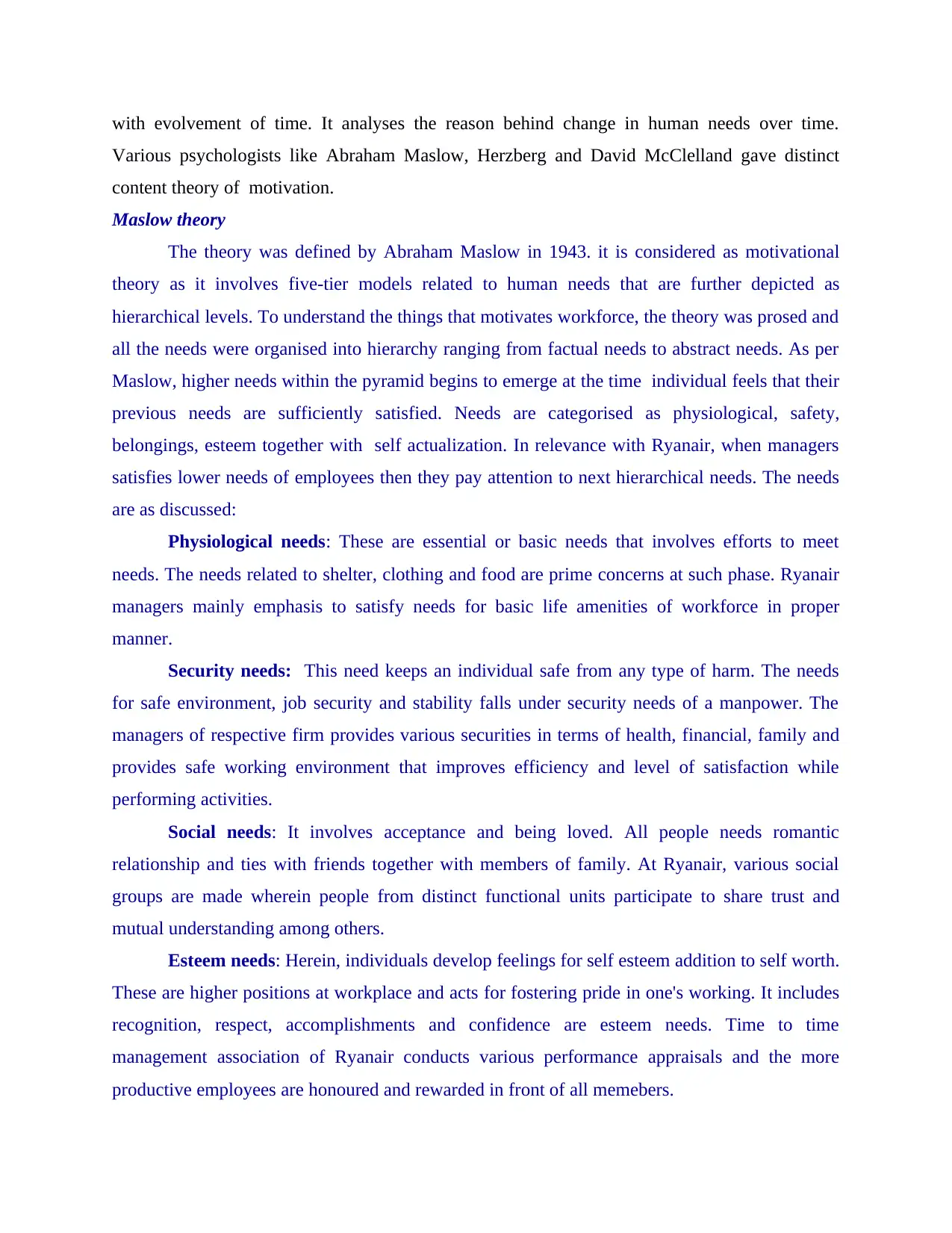
with evolvement of time. It analyses the reason behind change in human needs over time.
Various psychologists like Abraham Maslow, Herzberg and David McClelland gave distinct
content theory of motivation.
Maslow theory
The theory was defined by Abraham Maslow in 1943. it is considered as motivational
theory as it involves five-tier models related to human needs that are further depicted as
hierarchical levels. To understand the things that motivates workforce, the theory was prosed and
all the needs were organised into hierarchy ranging from factual needs to abstract needs. As per
Maslow, higher needs within the pyramid begins to emerge at the time individual feels that their
previous needs are sufficiently satisfied. Needs are categorised as physiological, safety,
belongings, esteem together with self actualization. In relevance with Ryanair, when managers
satisfies lower needs of employees then they pay attention to next hierarchical needs. The needs
are as discussed:
Physiological needs: These are essential or basic needs that involves efforts to meet
needs. The needs related to shelter, clothing and food are prime concerns at such phase. Ryanair
managers mainly emphasis to satisfy needs for basic life amenities of workforce in proper
manner.
Security needs: This need keeps an individual safe from any type of harm. The needs
for safe environment, job security and stability falls under security needs of a manpower. The
managers of respective firm provides various securities in terms of health, financial, family and
provides safe working environment that improves efficiency and level of satisfaction while
performing activities.
Social needs: It involves acceptance and being loved. All people needs romantic
relationship and ties with friends together with members of family. At Ryanair, various social
groups are made wherein people from distinct functional units participate to share trust and
mutual understanding among others.
Esteem needs: Herein, individuals develop feelings for self esteem addition to self worth.
These are higher positions at workplace and acts for fostering pride in one's working. It includes
recognition, respect, accomplishments and confidence are esteem needs. Time to time
management association of Ryanair conducts various performance appraisals and the more
productive employees are honoured and rewarded in front of all memebers.
Various psychologists like Abraham Maslow, Herzberg and David McClelland gave distinct
content theory of motivation.
Maslow theory
The theory was defined by Abraham Maslow in 1943. it is considered as motivational
theory as it involves five-tier models related to human needs that are further depicted as
hierarchical levels. To understand the things that motivates workforce, the theory was prosed and
all the needs were organised into hierarchy ranging from factual needs to abstract needs. As per
Maslow, higher needs within the pyramid begins to emerge at the time individual feels that their
previous needs are sufficiently satisfied. Needs are categorised as physiological, safety,
belongings, esteem together with self actualization. In relevance with Ryanair, when managers
satisfies lower needs of employees then they pay attention to next hierarchical needs. The needs
are as discussed:
Physiological needs: These are essential or basic needs that involves efforts to meet
needs. The needs related to shelter, clothing and food are prime concerns at such phase. Ryanair
managers mainly emphasis to satisfy needs for basic life amenities of workforce in proper
manner.
Security needs: This need keeps an individual safe from any type of harm. The needs
for safe environment, job security and stability falls under security needs of a manpower. The
managers of respective firm provides various securities in terms of health, financial, family and
provides safe working environment that improves efficiency and level of satisfaction while
performing activities.
Social needs: It involves acceptance and being loved. All people needs romantic
relationship and ties with friends together with members of family. At Ryanair, various social
groups are made wherein people from distinct functional units participate to share trust and
mutual understanding among others.
Esteem needs: Herein, individuals develop feelings for self esteem addition to self worth.
These are higher positions at workplace and acts for fostering pride in one's working. It includes
recognition, respect, accomplishments and confidence are esteem needs. Time to time
management association of Ryanair conducts various performance appraisals and the more
productive employees are honoured and rewarded in front of all memebers.
⊘ This is a preview!⊘
Do you want full access?
Subscribe today to unlock all pages.

Trusted by 1+ million students worldwide
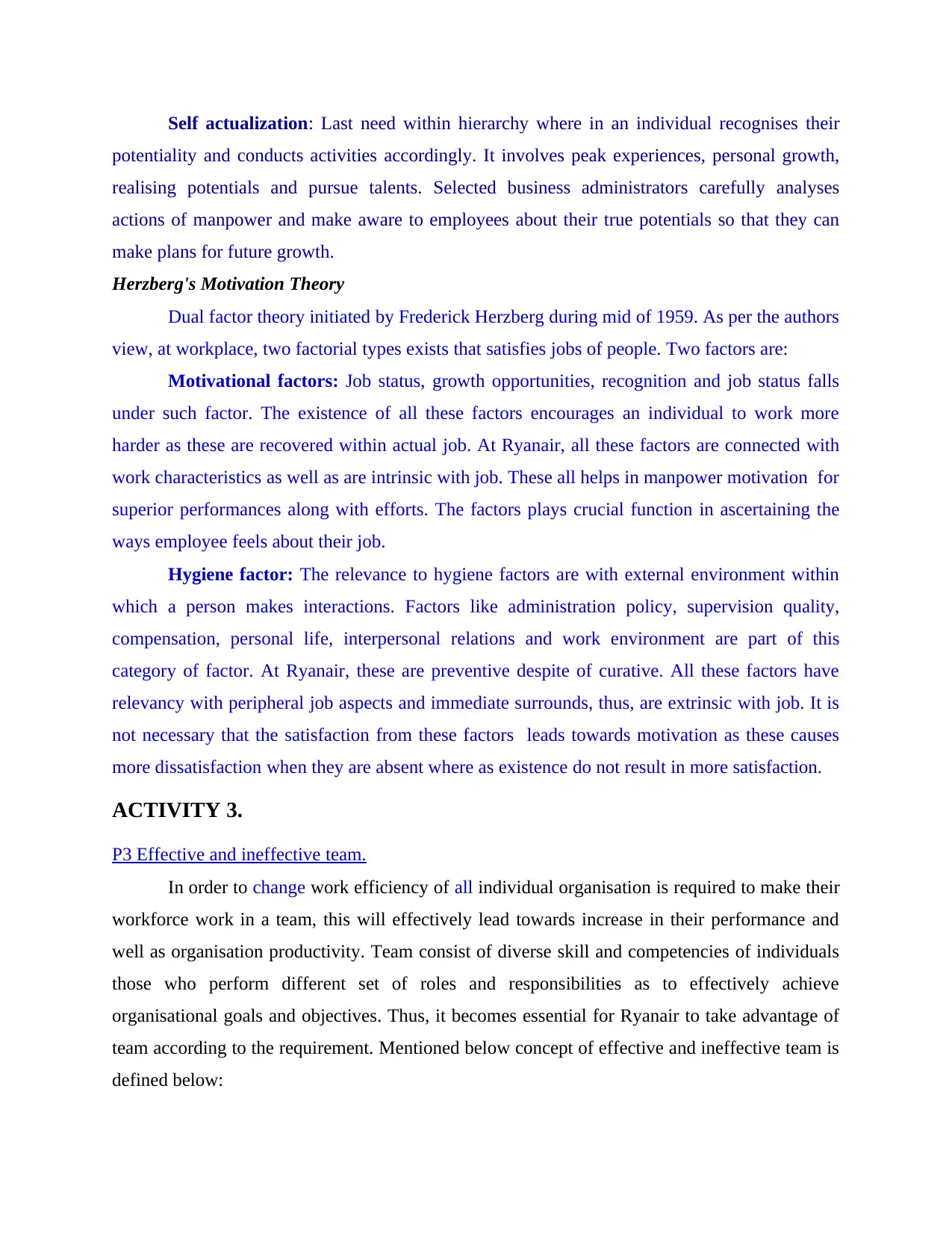
Self actualization: Last need within hierarchy where in an individual recognises their
potentiality and conducts activities accordingly. It involves peak experiences, personal growth,
realising potentials and pursue talents. Selected business administrators carefully analyses
actions of manpower and make aware to employees about their true potentials so that they can
make plans for future growth.
Herzberg's Motivation Theory
Dual factor theory initiated by Frederick Herzberg during mid of 1959. As per the authors
view, at workplace, two factorial types exists that satisfies jobs of people. Two factors are:
Motivational factors: Job status, growth opportunities, recognition and job status falls
under such factor. The existence of all these factors encourages an individual to work more
harder as these are recovered within actual job. At Ryanair, all these factors are connected with
work characteristics as well as are intrinsic with job. These all helps in manpower motivation for
superior performances along with efforts. The factors plays crucial function in ascertaining the
ways employee feels about their job.
Hygiene factor: The relevance to hygiene factors are with external environment within
which a person makes interactions. Factors like administration policy, supervision quality,
compensation, personal life, interpersonal relations and work environment are part of this
category of factor. At Ryanair, these are preventive despite of curative. All these factors have
relevancy with peripheral job aspects and immediate surrounds, thus, are extrinsic with job. It is
not necessary that the satisfaction from these factors leads towards motivation as these causes
more dissatisfaction when they are absent where as existence do not result in more satisfaction.
ACTIVITY 3.
P3 Effective and ineffective team.
In order to change work efficiency of all individual organisation is required to make their
workforce work in a team, this will effectively lead towards increase in their performance and
well as organisation productivity. Team consist of diverse skill and competencies of individuals
those who perform different set of roles and responsibilities as to effectively achieve
organisational goals and objectives. Thus, it becomes essential for Ryanair to take advantage of
team according to the requirement. Mentioned below concept of effective and ineffective team is
defined below:
potentiality and conducts activities accordingly. It involves peak experiences, personal growth,
realising potentials and pursue talents. Selected business administrators carefully analyses
actions of manpower and make aware to employees about their true potentials so that they can
make plans for future growth.
Herzberg's Motivation Theory
Dual factor theory initiated by Frederick Herzberg during mid of 1959. As per the authors
view, at workplace, two factorial types exists that satisfies jobs of people. Two factors are:
Motivational factors: Job status, growth opportunities, recognition and job status falls
under such factor. The existence of all these factors encourages an individual to work more
harder as these are recovered within actual job. At Ryanair, all these factors are connected with
work characteristics as well as are intrinsic with job. These all helps in manpower motivation for
superior performances along with efforts. The factors plays crucial function in ascertaining the
ways employee feels about their job.
Hygiene factor: The relevance to hygiene factors are with external environment within
which a person makes interactions. Factors like administration policy, supervision quality,
compensation, personal life, interpersonal relations and work environment are part of this
category of factor. At Ryanair, these are preventive despite of curative. All these factors have
relevancy with peripheral job aspects and immediate surrounds, thus, are extrinsic with job. It is
not necessary that the satisfaction from these factors leads towards motivation as these causes
more dissatisfaction when they are absent where as existence do not result in more satisfaction.
ACTIVITY 3.
P3 Effective and ineffective team.
In order to change work efficiency of all individual organisation is required to make their
workforce work in a team, this will effectively lead towards increase in their performance and
well as organisation productivity. Team consist of diverse skill and competencies of individuals
those who perform different set of roles and responsibilities as to effectively achieve
organisational goals and objectives. Thus, it becomes essential for Ryanair to take advantage of
team according to the requirement. Mentioned below concept of effective and ineffective team is
defined below:
Paraphrase This Document
Need a fresh take? Get an instant paraphrase of this document with our AI Paraphraser
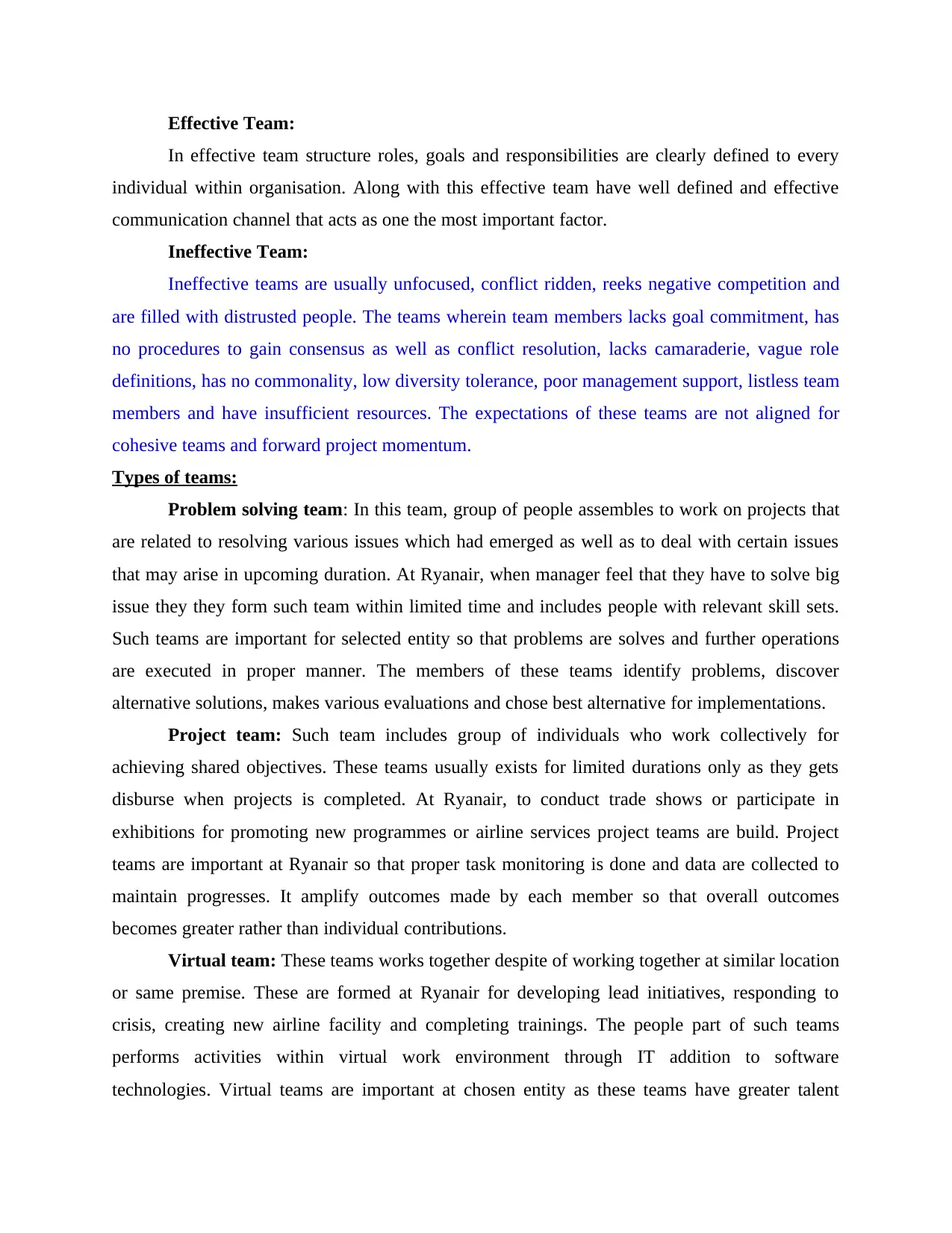
Effective Team:
In effective team structure roles, goals and responsibilities are clearly defined to every
individual within organisation. Along with this effective team have well defined and effective
communication channel that acts as one the most important factor.
Ineffective Team:
Ineffective teams are usually unfocused, conflict ridden, reeks negative competition and
are filled with distrusted people. The teams wherein team members lacks goal commitment, has
no procedures to gain consensus as well as conflict resolution, lacks camaraderie, vague role
definitions, has no commonality, low diversity tolerance, poor management support, listless team
members and have insufficient resources. The expectations of these teams are not aligned for
cohesive teams and forward project momentum.
Types of teams:
Problem solving team: In this team, group of people assembles to work on projects that
are related to resolving various issues which had emerged as well as to deal with certain issues
that may arise in upcoming duration. At Ryanair, when manager feel that they have to solve big
issue they they form such team within limited time and includes people with relevant skill sets.
Such teams are important for selected entity so that problems are solves and further operations
are executed in proper manner. The members of these teams identify problems, discover
alternative solutions, makes various evaluations and chose best alternative for implementations.
Project team: Such team includes group of individuals who work collectively for
achieving shared objectives. These teams usually exists for limited durations only as they gets
disburse when projects is completed. At Ryanair, to conduct trade shows or participate in
exhibitions for promoting new programmes or airline services project teams are build. Project
teams are important at Ryanair so that proper task monitoring is done and data are collected to
maintain progresses. It amplify outcomes made by each member so that overall outcomes
becomes greater rather than individual contributions.
Virtual team: These teams works together despite of working together at similar location
or same premise. These are formed at Ryanair for developing lead initiatives, responding to
crisis, creating new airline facility and completing trainings. The people part of such teams
performs activities within virtual work environment through IT addition to software
technologies. Virtual teams are important at chosen entity as these teams have greater talent
In effective team structure roles, goals and responsibilities are clearly defined to every
individual within organisation. Along with this effective team have well defined and effective
communication channel that acts as one the most important factor.
Ineffective Team:
Ineffective teams are usually unfocused, conflict ridden, reeks negative competition and
are filled with distrusted people. The teams wherein team members lacks goal commitment, has
no procedures to gain consensus as well as conflict resolution, lacks camaraderie, vague role
definitions, has no commonality, low diversity tolerance, poor management support, listless team
members and have insufficient resources. The expectations of these teams are not aligned for
cohesive teams and forward project momentum.
Types of teams:
Problem solving team: In this team, group of people assembles to work on projects that
are related to resolving various issues which had emerged as well as to deal with certain issues
that may arise in upcoming duration. At Ryanair, when manager feel that they have to solve big
issue they they form such team within limited time and includes people with relevant skill sets.
Such teams are important for selected entity so that problems are solves and further operations
are executed in proper manner. The members of these teams identify problems, discover
alternative solutions, makes various evaluations and chose best alternative for implementations.
Project team: Such team includes group of individuals who work collectively for
achieving shared objectives. These teams usually exists for limited durations only as they gets
disburse when projects is completed. At Ryanair, to conduct trade shows or participate in
exhibitions for promoting new programmes or airline services project teams are build. Project
teams are important at Ryanair so that proper task monitoring is done and data are collected to
maintain progresses. It amplify outcomes made by each member so that overall outcomes
becomes greater rather than individual contributions.
Virtual team: These teams works together despite of working together at similar location
or same premise. These are formed at Ryanair for developing lead initiatives, responding to
crisis, creating new airline facility and completing trainings. The people part of such teams
performs activities within virtual work environment through IT addition to software
technologies. Virtual teams are important at chosen entity as these teams have greater talent
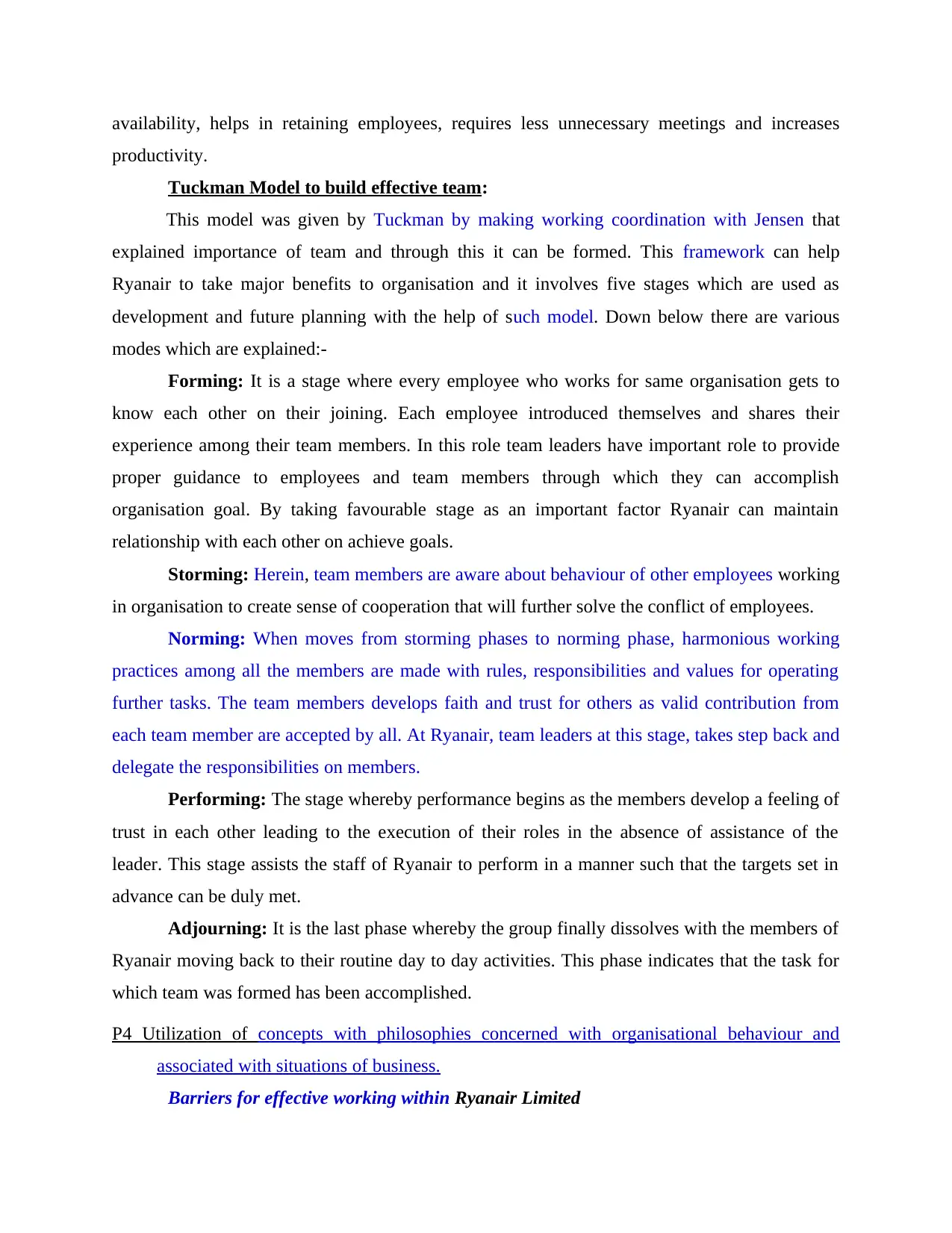
availability, helps in retaining employees, requires less unnecessary meetings and increases
productivity.
Tuckman Model to build effective team:
This model was given by Tuckman by making working coordination with Jensen that
explained importance of team and through this it can be formed. This framework can help
Ryanair to take major benefits to organisation and it involves five stages which are used as
development and future planning with the help of such model. Down below there are various
modes which are explained:-
Forming: It is a stage where every employee who works for same organisation gets to
know each other on their joining. Each employee introduced themselves and shares their
experience among their team members. In this role team leaders have important role to provide
proper guidance to employees and team members through which they can accomplish
organisation goal. By taking favourable stage as an important factor Ryanair can maintain
relationship with each other on achieve goals.
Storming: Herein, team members are aware about behaviour of other employees working
in organisation to create sense of cooperation that will further solve the conflict of employees.
Norming: When moves from storming phases to norming phase, harmonious working
practices among all the members are made with rules, responsibilities and values for operating
further tasks. The team members develops faith and trust for others as valid contribution from
each team member are accepted by all. At Ryanair, team leaders at this stage, takes step back and
delegate the responsibilities on members.
Performing: The stage whereby performance begins as the members develop a feeling of
trust in each other leading to the execution of their roles in the absence of assistance of the
leader. This stage assists the staff of Ryanair to perform in a manner such that the targets set in
advance can be duly met.
Adjourning: It is the last phase whereby the group finally dissolves with the members of
Ryanair moving back to their routine day to day activities. This phase indicates that the task for
which team was formed has been accomplished.
P4 Utilization of concepts with philosophies concerned with organisational behaviour and
associated with situations of business.
Barriers for effective working within Ryanair Limited
productivity.
Tuckman Model to build effective team:
This model was given by Tuckman by making working coordination with Jensen that
explained importance of team and through this it can be formed. This framework can help
Ryanair to take major benefits to organisation and it involves five stages which are used as
development and future planning with the help of such model. Down below there are various
modes which are explained:-
Forming: It is a stage where every employee who works for same organisation gets to
know each other on their joining. Each employee introduced themselves and shares their
experience among their team members. In this role team leaders have important role to provide
proper guidance to employees and team members through which they can accomplish
organisation goal. By taking favourable stage as an important factor Ryanair can maintain
relationship with each other on achieve goals.
Storming: Herein, team members are aware about behaviour of other employees working
in organisation to create sense of cooperation that will further solve the conflict of employees.
Norming: When moves from storming phases to norming phase, harmonious working
practices among all the members are made with rules, responsibilities and values for operating
further tasks. The team members develops faith and trust for others as valid contribution from
each team member are accepted by all. At Ryanair, team leaders at this stage, takes step back and
delegate the responsibilities on members.
Performing: The stage whereby performance begins as the members develop a feeling of
trust in each other leading to the execution of their roles in the absence of assistance of the
leader. This stage assists the staff of Ryanair to perform in a manner such that the targets set in
advance can be duly met.
Adjourning: It is the last phase whereby the group finally dissolves with the members of
Ryanair moving back to their routine day to day activities. This phase indicates that the task for
which team was formed has been accomplished.
P4 Utilization of concepts with philosophies concerned with organisational behaviour and
associated with situations of business.
Barriers for effective working within Ryanair Limited
⊘ This is a preview!⊘
Do you want full access?
Subscribe today to unlock all pages.

Trusted by 1+ million students worldwide
1 out of 17
Related Documents
Your All-in-One AI-Powered Toolkit for Academic Success.
+13062052269
info@desklib.com
Available 24*7 on WhatsApp / Email
![[object Object]](/_next/static/media/star-bottom.7253800d.svg)
Unlock your academic potential
Copyright © 2020–2026 A2Z Services. All Rights Reserved. Developed and managed by ZUCOL.




